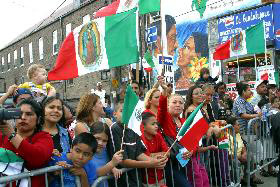 |
 |
 |
 Editorials | At Issue | July 2005 Editorials | At Issue | July 2005  
Many Hurdles To Voting Abroad
 Ana Marνa Salazar - Special to The Herald Ana Marνa Salazar - Special to The Herald


| | The Mexican people abroad can now celebrate the passage of a measure allowing them to vote in the 2006 elections in Mexico. (Photo: EFE) |
There's no question that the passing of legislation that allows Mexicans living abroad to vote in the 2006 presidential elections is historical.

It was politically inconceivable to think that Congress could deny that right to Mexicans who provide 2.46 percent of this country's GDP making Mexico the second largest remittance-recipient nation in the world, behind India.

In 2004, the sacrifice of these Mexican workers living abroad translated into US16.6 billion that went to some of the poorest and most disenfranchised communities in Mexico. And despite the efforts of the U.S. government to stop the flow of migrants, (an initiative that receives little support of the Mexican government), the tide fails to recede.

In fact, we can expect that the number of migrants trying to reach the United States will increase. Economic reforms that would create more job opportunities in Mexico, and eventually stop this wave of undocumented Mexican workers, seem impossible or at least decades away.

VOTING POWER

Mexico's future is uncertain. What is certain is that the political and economic influence of Mexicans living abroad will increase. This economic and political reality provided the incentive for the legislators of the three major political parties PRI, PAN and PRD to ensure that they did not go down in history as the barrier that stopped Mexicans abroad from voting in their upcoming elections. Now that they can vote, the fundamental question is: Will their vote define who will be the next president of Mexico in 2006? The answer is: Not likely.

The potential pool of voters was dramatically reduced by Congress when they approved legislation that required Mexicans living abroad to have voting credentials issued in Mexico in order to receive a ballot.

Therefore, based on the 12 million Mexicans living abroad, experts calculated that only 4 million posses this document. Of those who do have the credential, experts say only 400,000 to 800,000 will vote.

Based on my own experience with Americans voting abroad in the 2004 presidential elections, I believe that the number of potential voters is overly optimistic. I would be surprised if 100,000 Mexicans abroad ended up voting.

CHALLENGES STILL NUMEROUS

Even though there are basic differences between U.S. and Mexican legislation, voters living abroad in each country face similar challenges if they want to exercise their right to vote. Compared to citizens living abroad, voting at home is a relatively easy thing to do. Voting officials, parties and candidates go out of their way to make sure that potential voters get the information they need in order to register to vote, and they make sure voters are aware of key deadlines.

On voting day, local media outlets make it impossible to forget that election day has arrived, and that the only thing a voter needs to do is get to a voting station and fill out a voting ballot.

For those who live abroad, voting is a process that can last months. The first and perhaps most difficult problem is getting information, and only the most disciplined and motivated voters will make the effort to get information from their embassy or from the Internet.

If they are registered to vote, they must advise election officials that they intend to vote, as well as where the ballot should be mailed. The officials must then send the ballot to the correct address.

Not only does the voter have to receive the ballot, but he must receive it on time. There are still a few more steps, such as filling out the ballot and finally sending it out, while crossing your fingers that elections officials will not only receive the ballot, but that they will receive it on time.

STILL EXERTING INFLUENCE

At any point in these timeconsuming steps, a voter may get discouraged and simply decide that their vote is not worth the effort. (For a survey on U.S. voters abroad and the difficulties they faced during the 2004 election, visit: http://www.overseasvote.org) My point is, if there is an absentee problem at home, because citizens simply don't think it is important to vote, you can imagine the challenges faced by election officials and candidates to get voters abroad to vote.

In fact, I believe that Mexicans living abroad will exercise a stronger influence over the elections if they simply call their relatives a couple of days before the July 2006 elections and strongly urge them to go out and vote for the candidate that best reflects the needs of those living abroad.

Ana Maria Salazar Slack is a former White House, Pentagon and State Department official under the Clinton Administration. She hosts the only nationwide Englishspeaking news program in Mexico. For time and stations go to www.imagen.com.mx/news or write to anamaria@imagen.com.mx. | 
 | |
 |



